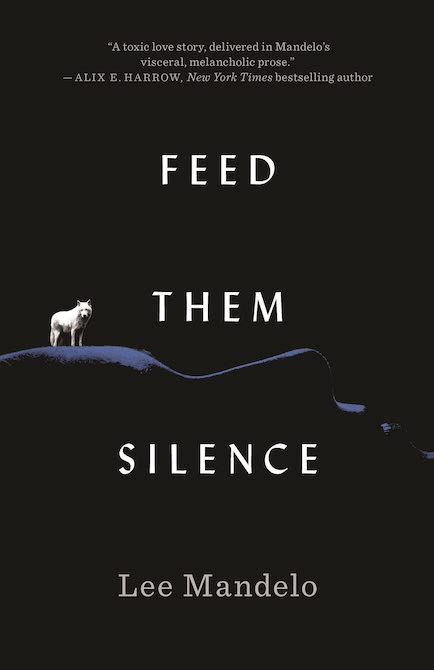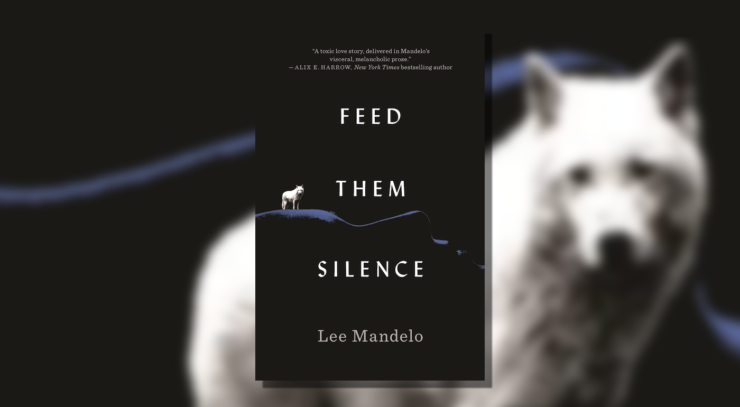What does it mean to “be-in-kind” with a nonhuman animal?
We’re thrilled to share an excerpt from Feed Them Silence by Lee Mandelo, out from Tordotcom Publishing on March 14.
What does it mean to “be-in-kind” with a nonhuman animal? Or in Dr. Sean Kell-Luddon’s case, to be in-kind with one of the last remaining wild wolves? Using a neurological interface to translate her animal subject’s perception through her own mind, Sean intends to chase both her scientific curiosity and her secret, lifelong desire to experience the intimacy and freedom of wolfishness. To see the world through animal eyes; smell the forest, thick with olfactory messages; even taste the blood and viscera of a fresh kill. And, above all, to feel the belonging of the pack.
Sean’s tireless research gives her a chance to fulfill that dream, but pursuing it has a terrible cost. Her obsession with work endangers her fraying relationship with her wife. Her research methods threaten her mind and body. And the attention of her VC funders could destroy her subject, the beautiful wild wolf whose mental world she’s invading.
Over four monitors spread throughout the lab, the team watched Dr. June and her assistant return Kate to the forest via ATV, secured across the safe-rack like a huge swaddled child. The trap-camera captured one angle and the assistant’s cell phone another. At the tree line, the pair of them hustled the wolf’s ungainly body to the ground. The assistant unwrapped the animal and swept her from tail to snout with the camera. The patch-film Dr. June had applied was roughly the same shade as Kate’s skin below her coat, hiding her stitches.
Buy the Book


Feed Them Silence
“She’ll be alert in fifteen to twenty minutes,” June said to the microphone. “We’ll wait with the ATV until she starts to come ’round, then we’ll book it. The pack should approach her soon.”
Sean sipped a cold brew, monitoring the unconscious wolf and her team at turns. Alex and Dahye paced the length of the dimmed lab windows in muted conversation with one another, Christian idled at the coffee maker waiting for their fourth refill, Aseem spun his studio chair at precise 180-degree turns with a kick of each heel, left-right-left-right. Two research assistants, one technician for the interface, a fellow neuroscientist, and herself, the researcher-subject.
A commotion startled them all as the ATV revved and Dr. June announced, “There she goes!”
Kate’s left hindquarter flexed, paw scrabbling at the earth. Her ears flicked and her jaw muscles tensed. As engine roar filled the lab, the RA’s prurient camera zoomed in on her half-alert face, tongue working across a row of yellowed teeth while one eyelid fluttered. Aseem stopped spinning. Sean held her breath. If they’d damaged her…
Kate lifted her head on an unsteady neck and growled.
“Go,” June barked to her RA.
The assistant passed her the camera and drove them away while Kate receded from view. Her legs wobbled under her as she stood, sat, stood again. The trap-camera broadcasted her stagger into the woods, loopy from sedation but promisingly mobile. Sean sighed deep in her gut. The chip tracker showed Kate moving farther into the forest; matching blips for the remainder of the pack ranged a few miles out, nearer the creek than the field-line.
“What if it doesn’t work?” Aseem groaned, echoing Sean’s own worries.
“We’re about to find out,” Christian responded. “Ready for setup, boss?”
Sean drained the last milky gulp of her coffee and thumped the mason jar onto the table. On-screen, Dr. June and the RA began breaking down their field surgery site. In an hour there would be no record of their presence aside from the ruts in the field, the neural mesh in the wolf’s skull, and the data Sean intended to broadcast into her own. And if she failed, there might as well be nothing at all—just her wife’s I told you so and her public career crash.
“Let’s do this thing,” she said.
At the south end of the lab, Dahye unlocked the interfacing room first with the physical key and then with the digital access code. Alex bounded into the room with his sterile prep kit to wipe down the “magic machine,” as June had referred to it. Aseem tapped away on the lab’s main computer, shifting camera feeds to program feeds, research notes, and the interface’s readout. Its cursor blinked eagerly on an otherwise blank screen. Christian stood beside Sean’s chair, silent for a beat, as her fingertips tapped nervously on the armrest.
Steadying, they asked, “Are you comfortable with the procedures, Dr. Kell-Luddon?”
“I remember them,” Sean said.
She thought her skin would vibrate off her bones if she had to wait for much longer, pretending to be calm. All the sacrifice and uncertainty of the past twenty-six months had led to this moment; her team bustled through their first execution of protocols, turning like a well-oiled gear. But what use was a performance of competence if the results fell through? People remembered failures longer than successes. Sean steadied her breathing, five-counts in through her nose and out through her mouth.
“I think we’re good to go,” Christian said as Alex gave them the thumbs-up.
Sean followed them into the hospital-bare cubby containing the machine’s interface: a giant padded recliner resembling an upscale dentist’s chair with gnarled limbs of cables sprouting from its headrest, arms, and frame. The helmet looked like a salon blow-dryer—the gentle padded restraints for the subject’s limbs, not so much, unless it was a very particular kind of salon. Christian wheeled their tool cart to the desk in the far corner and gestured for Sean to settle in. As they wiped her scarred temple with a sterile pad, astringent scent invading her nostrils, their pale gray eyes flicked to meet hers.
“We’ll activate when the map shows her approaching the pack,” Sean said.
“Aye-aye,” Christian agreed.
The plush recliner sucked her into its embrace. Though the prep was painless, Sean’s physical reaction to being strapped in belied her discomfort—racing pulse, cold prickling washes of nerves. Christian’s hands were sure on the restraints, firm on her wrists and ankles. Their brow furrowed with concentration as they adjusted the neck brace and lined up the edges of the helmet before lowering it and locking the mechanism into place. The visor screen was blank, sensory deprivation plunging Sean abruptly into nothingness. No sound, no sight, nothing outside of her thrumming flesh and blood. The fact that the Chilson-Reed interface had originally been designed for treating post-traumatic stress and degenerative memory disorders made her darkly, briefly chuckle. Aside from the wildly prohibitive costs to the uninsured, Sean had a feeling being trapped in sensory void while a machine reprogrammed your brain’s chemical functions might be traumatic enough on its own. The three trial runs she’d gone through to test her own uplink hadn’t been pleasant.
Through the helmet’s speakers, Christian said: “Comfortable and secure?”
Sean gave a sideways thumbs-up. Leather stuck to her stress-wet palms.
“Your readouts are coming through normal, though elevated general arousal, obviously. Reception is at standby-active, you’re in the machine,” they confirmed. “I’ll give you a countdown once Kate starts to approach. Her transmission is broadcast-active too, FYI, but until we flip the proverbial switch your interface won’t import it. No errors so far.”
Only in the emptiness could Sean, edgy and nauseous, admit to herself, I’m about to pipe another brain into my brain. She would become the researcher-subject, the every(wo)man scientist hero, unless the first attempt scrambled her gray matter bad enough to sink the whole project. Animal trials had gone fine, humans using the original program were fine, safety protocols were in place. And yet, she was abruptly terrified. Riya had given her a perfunctory kiss on the cheek over a pot of grits that morning, and Sean hadn’t told her it was launch-day; she hadn’t said, hey, I love you, in case I die or something. Too focused on preparing herself for the big event.
“Approaching,” Christian announced crisply. “Five, four, three, two—”
One faded into a tinny hum as the linkage queued. The stench of alcohol swab disappeared beneath a rich wash of olfactory input, smell so intense it held texture inside her skull. Visuals swam across the projection screen in saturated colors, initially blinding. After a moment they established a readable pattern before her eyes, as if the creek bed were running through a series of photo filters. The interface programming struggled to render a human-accessible spectrum from the more-than-human input pouring from the wolf’s neural system. Sean’s nose, or more accurately her cognitive processes for scent, overloaded with stinking data: loam-dirt-piss-trees-family-home. Last came the jolting impact of four legs loping, a powerful haunch and spread paws with claws grabbing earth; restraints dug into human skin and bone with tender security as she instinctually attempted to match the sense of movement with reality. Sean wrestled for clarity through the phantom sensorium, dug for herself beneath her sublimation within another being. Protocol for processing disorientation or overload was to repeat her name and address and the date; her flexible human lips and tongue moved across dull slick teeth as she began to mutter, “Sean Kull-Luddon, 279 Rogers Parkway—”
A yipping howl bloomed from her left, its frantic edge calling her home so firmly that she—Sean, or the wolf—spurred into a sprint despite her sore head and unwieldy muscles. Once again the chemical saturation bowled over Sean’s distancing protocols, rolling her consciousness under the relief of barreling into her sibling’s body at full speed. The wolves rolled across the loamy forest floor, slobbering on faces and chewing ears and outpouring love. The startling recognition of a specific feeling—plus the cracking stretch of her own heaving rib cage—offered Sean a brief psychic harbor to cast anchor in; she hitched herself onto an immediate drive to name the wolf’s desire, to tie her own desire neatly around it. Think, don’t just feel. Translating through speech and language, Sean split her attentions between the staggering wealth of affective input and her critical understanding of those inputs; she catalogued Kate’s relief at seeing her sibling again, after such a frightful happening, and she breathed easier. The wolf had a whole and particular grammar of knowing and naming. When the remainder of the pack arrived moments later, Sean had no need for the names her team had given them any longer—the scents differentiated them, scents she couldn’t cross-reference while swimming through the midst of so much soupy qualia.
The shutoff triggered and the data flood cut, abrupt.
Sean smashed against the loss like a concrete wall, her sudden self-isolation triggering a savage, throbbing headache. She pried her clenched jaw apart and worked saliva across her dry teeth while the muscles at the front of her throat spasmed from overuse. Already, the intensity of feeling had begun to wash loose—except for the alien, beautiful ease with which the wolf had fallen back into her family. When Christian eased the helmet off, Sean grunted through a snotty nose, “Holy fuck.”
Excerpted from Feed Them Silence, copyright © 2022 by Lee Mandelo.










